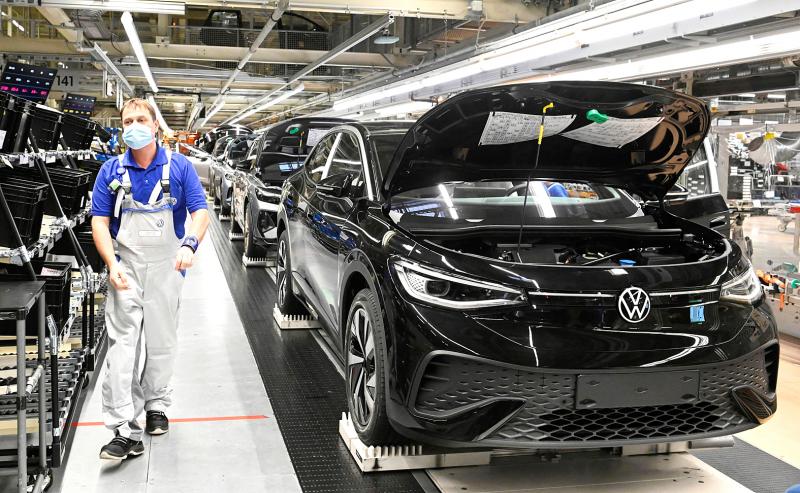Ford Motor Co is curbing its North American vehicle production this week due to a semiconductor shortage, US media reported on Saturday, while Volkswagen AG is cutting many night shifts.
Ford plans to suspend production of vehicles including the Ford Bronco, the popular F-150 pickup and the new Mustang Mach-E electric vehicle at its plants in Michigan, Illinois and Mexico, CNBC and other media said.
Production is to be slowed at other facilities in Missouri, Michigan and Kentucky, while overtime is to be eliminated at Ford’s operations in Oakville, Canada.

Photo: Reuters
A shortage of semiconductors — essential vehicle components primarily manufactured in Asia — has affected automobile production since the beginning of the COVID-19 pandemic, causing prices to spike and contributing to surging US inflation.
US President Joe Biden, keen to boost his country’s auto manufacturing, wants to bring semiconductor chip production back to the US and has held several events to promote massive domestic investments.
Meanwhile, US lawmakers on Friday voted to approve legislation aimed at facilitating tens of billions of dollars in chip research and manufacturing, countering China’s growing influence and easing a global shortage of computer chips.
Late last month, high-tech giant Intel announced that it would begin construction late this year of two semiconductor factories in Ohio, with the aim of producing chips by 2025.
Biden called the US$20 billion investment “historic.”
In Germany, Volkswagen plans to cut nearly all night shifts at its main plant as Europe’s largest automaker continues to battle the semiconductor crisis.
Volkswagen is to cut the night shift, for which workers receive extra pay, from the start of the second quarter on three assembly lines in Wolfsburg, the automaker said on Friday.
The move has drawn ire from Volkswagen’s labor head Daniela Cavallo, who said a compromise on compensation must be found.
“Our colleagues aren’t responsible for the fact that order books are overflowing while we can’t make the vehicles because of the lack of semiconductors,” Cavallo said in the post. “We’ll fight for partial compensation.”
Only a fourth assembly line that handles the Tiguan and its hybrid models, the Touran and Seat Tarraco, are to run early, late and night shifts, Volkswagen said.
Volkswagen CEO Herbert Diess hinted at job cuts in November last year to stay competitive in the face of Tesla Inc and the shift to electric vehicle production. The global shortage of chips forced Volkswagen to slash output at the sprawling Wolfsburg factory last year.
The decision to cut the night shift was made in response to repeated short-notice cancelations and the need to furlough workers, the company said.
“It is unavoidable that we adjust our shift model to maintain competitiveness and secure jobs in the long term,” said Gunnar Kilian, the board member in charge of personnel.
“Unfortunately, this step will also involve workforce cuts and the loss of hardship allowances for the night shift,” he added.
Additional reporting by Bloomberg

To many, Tatu City on the outskirts of Nairobi looks like a success. The first city entirely built by a private company to be operational in east Africa, with about 25,000 people living and working there, it accounts for about two-thirds of all foreign investment in Kenya. Its low-tax status has attracted more than 100 businesses including Heineken, coffee brand Dormans, and the biggest call-center and cold-chain transport firms in the region. However, to some local politicians, Tatu City has looked more like a target for extortion. A parade of governors have demanded land worth millions of dollars in exchange

Taiwan Semiconductor Manufacturing Co’s (TSMC, 台積電) revenue jumped 48 percent last month, underscoring how electronics firms scrambled to acquire essential components before global tariffs took effect. The main chipmaker for Apple Inc and Nvidia Corp reported monthly sales of NT$349.6 billion (US$11.6 billion). That compares with the average analysts’ estimate for a 38 percent rise in second-quarter revenue. US President Donald Trump’s trade war is prompting economists to retool GDP forecasts worldwide, casting doubt over the outlook for everything from iPhone demand to computing and datacenter construction. However, TSMC — a barometer for global tech spending given its central role in the

An Indonesian animated movie is smashing regional box office records and could be set for wider success as it prepares to open beyond the Southeast Asian archipelago’s silver screens. Jumbo — a film based on the adventures of main character, Don, a large orphaned Indonesian boy facing bullying at school — last month became the highest-grossing Southeast Asian animated film, raking in more than US$8 million. Released at the end of March to coincide with the Eid holidays after the Islamic fasting month of Ramadan, the movie has hit 8 million ticket sales, the third-highest in Indonesian cinema history, Film

Alchip Technologies Ltd (世芯), an application-specific integrated circuit (ASIC) designer specializing in server chips, expects revenue to decline this year due to sagging demand for 5-nanometer artificial intelligence (AI) chips from a North America-based major customer, a company executive said yesterday. That would be the first contraction in revenue for Alchip as it has been enjoying strong revenue growth over the past few years, benefiting from cloud-service providers’ moves to reduce dependence on Nvidia Corp’s expensive AI chips by building their own AI accelerator by outsourcing chip design. The 5-nanometer chip was supposed to be a new growth engine as the lifecycle